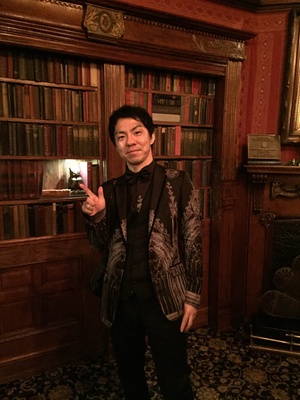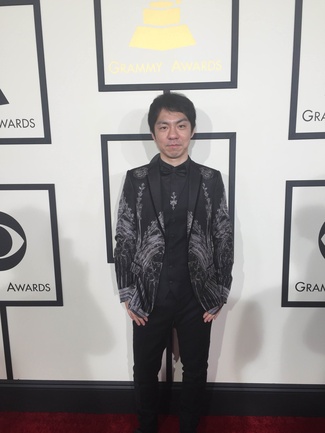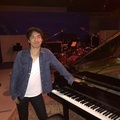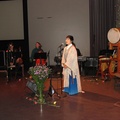Do you listen to American music, and who are some of your favorite composers, and groups?
Yes! Of course, I love American music. There are too many to recite here, but let’s say I listen to American pop artists like Katy Perry, Taylor Swift, Maroon 5, and Bruno Mars who all inspire me to write high energy and melodic pop songs that I think the Japanese audience enjoys as well.
For composing soundtracks for TV, I was very influenced by the music of the "Dragon Quest" TV game.
Do you have any aspirations to write music for American artists?
Yes, that is the one of the reasons I spend so much time in the U.S. Hopefully, I will get the chance to write for a prominent performer such as one of the artists I just mentioned who are on my ‘Top American favorites’ list.
What inspires you to write music? Are most of your pop songs about love? Can you tell us about your hit songs and what the teens and young adults like to listen to in Japan?
Mostly, I play piano before composing and that gets me into a creative mood. Sometimes I come up with the top line while taking a bath, or in the shower. (laughs) Seriously, I hum melodies in the bath. You never know when a tune will come to you. I don’t only write about love. It depends on lyrics, and the subject may change in the writing process. Then at other times, I write a song and I don't think about anything, or any topic at all, and just express my feelings—somehow it comes together. Call it luck, or some call it a gift. I think about it sometimes and just feel fortunate to be doing what I do.
I have written many types of music such as idol, rock, pop, anime, and above all, the my title hit song on the album, Aisubeki Miraie was very well received and sold more than 1,500,000 copies as the album title song. And, just like any place else in the world, it’s mostly teens that listen to popular songs and shape the modern music world. There are always exceptions though, and I know plenty of older people in Japan who still attend concerts, and who couldn’t live without music in their lives.
For TV anime, I composed the ending theme song for the Pocket Monster series, Best Wishes, and for the movie, Pikachu to Eievui Friends, I wrote the ending theme song, “Te wo Tsunagou.” (手をつなごう)Those two TV shows are very well known and have large followings.
How is it writing for artists, or maybe just writing not knowing who will perform your music? Is it difficult for you, or have you adjusted to this process?
I think that the best point of reference when writing is to assume who may be the best singer for my songs. Writing a song is a normal process for me at this point; but sometimes I write with no particular person in mind, and then I have to figure out what artist or group would best perform a song. I didn't make many changes to the song performed by EXILE because I loved their voices from the beginning and their interpretation was so perfect. It really came together quite magically!
Speaking of Magic! (You have used that word twice now) I heard you are also a magician, is this true?
It’s true! My intrigue with magic came about when I was really young. Someone brought me to a magic bar in Japan when I was only 6 years old. After that experience, I knew I had to learn how to do magic. Once I saw magic performed that was it; I was charmed very much and magic became my hobby.
By the time I was a young adult, I had heard about the reputation of Hollywood’s Magic Castle, and that it was the number one magic organization in Los Angeles. I dreamed to become a magician member there, and now I am. It’s awesome. I love to see how people are touched and surprised. I make a lot of people laugh, and some get mad when they can’t figure out my tricks! That’s why it’s called magic.
So, yes, I am both a musician and a magician!
What trick do you do that most fascinates people?
I think I have two tricks that I do that seem to surprise people very much. One of them is levitating my body off ground. People are blown away by this trick and ask me how I do it in deep astonishment. The other one is a trick using number magic, and I can do even here in this article, so here we go!
1. Imagine a number- whatever number comes to mind.
2. And then Times it by 2, Plus 8, then Divide by 2
3. Subtract original number you imagined first.Now you have the number of members in The Beatles!
How did you get hired to write the music for the latest Pokeman movie theme?
A producer who I was already working with at Sony Music submitted a theme that I composed to the Pokeman production team and they decided to use it. I was really happy, obviously, because the POKEMAN SERIES has such a great following.
Writing for film and TV in Japan is different than the process used by composers in the U.S. In the states, composers will see the actual visuals and compose music that fits the frames, while in Japan it is common to compose music without visuals and sound engineers do the work to make it all fit. How is it composing without seeing the visuals?
Composing for film and TV is done a bit differently, but over in Japan, we are used to it. I understand it might be difficult for those trained to use visuals while writing. Usually, in Japan, a director will give a direction and tell you how many minutes and all the hard work of editing the right parts for the right scenes are done in the editing stage. In a sense it makes our job easier and the burden is on the editor to make it all work.
You live several months out of the year in Los Angeles. How do you like it? What are some of the Japanese restaurants you like in LA? Others you like?
It's not easy sometimes in LA because of the language barriers. Unfortunately, I did not start to learn English until after I was 30 years old. So, you can imagine I am still struggling to speak proper English when I am in the states. But, thanks to my many friends in LA who are always patient and help me figure things out, I manage to live there nicely. My favorite restaurants so far are Katsuya sushi restaurant, TAKUMA Japanese food, and I love HAYATEMARU Ramen place!!! I am a night owl and sometimes get cravings and appreciate the places that are open late for a midnight snack.
What do you miss most about Japan when you are in the states and vice versa, when you are back in Japan, what do you miss about LA, or the U.S.?
There is a large community of Japanese people living in LA, but when I am there I do miss the Japanese food back home, and of course, I miss my family. And, conversely, when I am back in Japan, I miss my close friends, the composers I work with, and the fabulous dry weather in CA!
How do you like the English language? How did you begin learning it?
The main difference I learned when speaking English is that I can be more expressive than Japanese! It's tough because as I said, I started learning it late. At first, I began to study it on my own and then attended class at an English school in Japan called, GABA.
Can I let you in on a secret? I have someone special to thank for inspiring me to study the language. I became interested in studying English thanks to YOSHIKI. He really emphasized the importance of learning English if I wanted to work in the states and be able to communicate with musicians and other people. He was the main person who contributed to my already strong desire to be successful outside of Japan. I am learning more English every day. He inspired me in every way musically, and his advice to learn English proved to be so important.
Is there a difference in the way the language makes you feel?
Yes, I feel like a different person when I'm speaking English; the best way to describe it is that I feel like the ‘ideal me.’ I become more outgoing and take on a kinder personality, even though my ability to speak the language isn’t that great. The language gives me a whole new perspective-like wearing a different identity, or taking on a whole new persona. There are things you can say, or attitudes you can adapt when you learn a new language. It opens up another part of you that you never knew was there.
Do you think you would ever consider a live concert to showcase your music to both fans, and Japanese-Americans interested in hearing your music?
One day perhaps… Someday I would like to have a solo program and band to take on the road. I’d love to perform my music abroad-especially since there are so many fans from many different countries that follow the anime and J-Pop genres; it’s fascinating.
I visited your blog on ameblo.jp called ‘The Best Day of My Life,’ by Masanori Takumi. Do you blog on that site yourself, or do you have a staff? I noticed that you were somewhat low-key with your online presence. Would you say that Japanese people are less into self-promotion than in some other cultures?
Yes! There is so much progress in the way of social networking such as Facebook and Twitter. I have to confess, I am terrible about blogging and updating a page I started a while back. I spend my time writing music. I try to write something new every day. I am a writer and not a front man, or solo artist performing vocally. If I were a singer, I would have to promote myself better, or have a staff to do it. It’s more important for me to stay in a creative mode, than to be obsessed with online promotion of my work.
I think it’s the same all over the world as far as pop singers promoting their careers, or having people to do it for them-they must do it in order to survive the trends. I am not caught up in that, but respect the fact that it is now the norm for most recording stars, and groups. And, I won’t deny; I think I’ve peeked at Taylor Swift’s Twitter blog once or twice!
Your musical collaborations have had far-reaching effects on many, including those in Jamaica. You have been working with the Grammy nominated duo Sly & Robbie produced by Sony Japan, and have even been nominated for a Grammy Award for your work on their album. That must have been exciting! How is it that you got involved with the group? I mean they are all the way in Jamaica! Can you tell us a bit about your experience being nominated for an award, and attending the Grammy Awards in Los Angeles?
My friend, Hitoshi Shimoda used to be an executive producer for the group and introduced me to the duo, and to Kaz Asomuma who is the music producer of Sly & Robbie. In 2010, I worked as a guitarist on their album. It was a critically acclaimed and amazingly, it was nominated for Best Reggae Album and brought me to the Grammy Awards in Los Angeles. It was a once in a lifetime opportunity for me. I may not be up on blogging online, but I have become accustomed to working digitally with groups. This is when technology really serves a great purpose: to bring musicians and creative people who are across the globe together to work on music. I live in Japan and I could participate with Sly & Robbie thanks to progress of Internet. Since, I have been collaborating with lots of different people on various projects. There are no boundaries in the digital world.
Do you plan on working again with Sly & Robbie?
Yes, we have already started the next album that will be released by the end of this year. Again, I am so excited to join in the production and play some instruments on the album. I’ll be as excited as I have been the years before if we should be nominated for a Grammy again. It’s so thrilling to be recognized by your industry peers, and fans.
Will you keep in touch to share your future successes with our readers?
Of course! I’ll do my best. (lol) But, as I said, I am sort of a studio hermit and dedicate most of my time to the creative process so I can make music.
What is the best way for your fans to reach you, on Facebook, or your blogspot?
On Facebook please: https://www.facebook.com/MasanoriTakum
When I do blog, I don't write in English on the blog I created.
Thank you Masanori. It was great to get acquainted with you and your fascinating history and life. I am sure that readers will follow your career closely, and some might even and look for you in the LA ramen houses late at night. You are surely a most talented and versatile songwriter, musician and magician!
© 2015 Rachelle Cano







